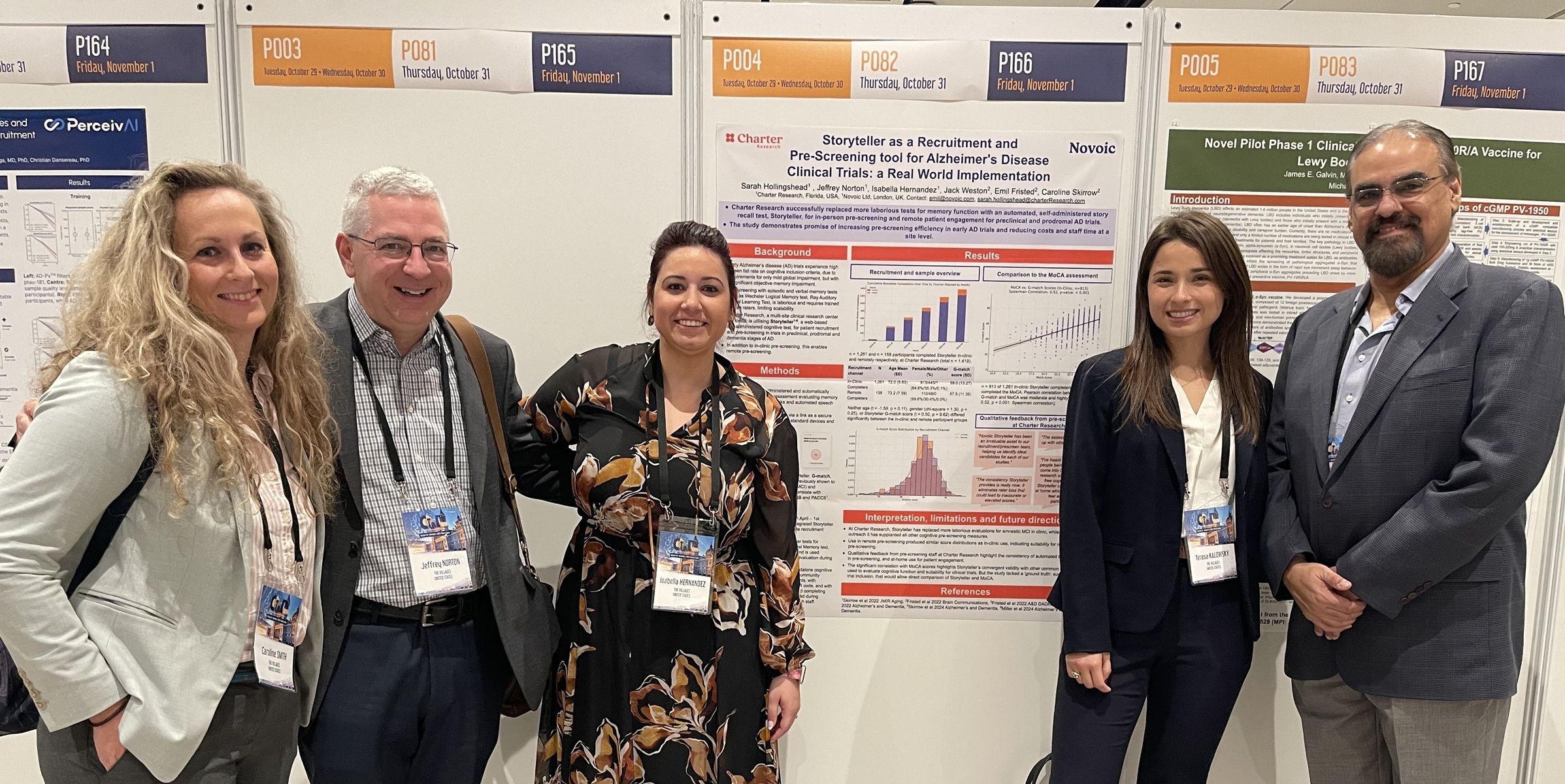Dispatch From The Front Lines Of Alzheimer’s Research
Last week, members of the Charter Research team traveled to Madrid, Spain, to attend the 17th Clinical Trials on Alzheimer’s Disease (CTAD) Conference, held from October 29 through November 1, 2024. Thousands of scientists, physicians, and research leaders from around the globe met to share the latest findings, breakthroughs, and advancements in Alzheimer’s research and treatment.
We wanted to let you in on some of the key takeaways from CTAD. These insights focus on innovations in early detection, treatment options, and potential new approaches for managing symptoms. What do these updates mean for you? Read on!
Using Blood-Based Biomarkers To Detect Alzheimer’s
A new and simpler way to detect Alzheimer’s disease (AD) could soon be available to you through an easy-to-use finger-prick blood test. Researchers at the conference shared updates about advancements in testing for p-tau217, a key biomarker of AD. Unlike a traditional PET scan or lumbar puncture, which can be expensive and require a trip to a specialized facility, the blood test can be done in the convenience of your home. The test could possibly help your doctor discover potential memory issues early on so that you can access the right treatments sooner.
Increased Focus on Amyloid and Tau Interaction
A group of researchers introduced new guidelines that could make Alzheimer’s diagnosis more accurate. Instead of concentrating on a single biomarker, like amyloid plaque, doctors are now encouraged to consider a combination of both amyloid and tau markers, along with symptoms.
The new criteria could mean a clearer, more reliable diagnosis for you or someone you love. Understanding how these markers interact can help doctors offer more precise and personalized care.
“While the amyloid theory is not ‘dead,’ there is more agreement now than ever that the interaction of amyloid and tau together is pivotal in the advancement of dementia,” said Dan Davis, Vice President of Business Strategy at Charter Research.
Diverse Targets Beyond Amyloid and Tau in Alzheimer’s Treatment
Scientists at the conference also shared research about using a helper protein called interleukin-2 as a new therapeutic target, beyond amyloid and tau. This treatment focuses on reducing inflammation in your brain and strengthening special immune cells that protect it.
Early study findings suggest that this treatment could possibly help people with mild-to-moderate Alzheimer’s preserve their mental clarity and memory for longer, with few side effects.
In another presentation, researchers shared promising early results for a new therapy that targets people with the specific genetic marker called APOE4, which has been linked to greater risk of developing Alzheimer’s.
The treatment is called LX1001 and it aims to reduce Alzheimer’s disease progression by delivering a protective gene called APOE2 directly into the brain. People with APOE2 have a reduced risk of developing Alzheimer’s.
“It is good to see a more diverse approach to attacking dementia so that we are expanding our knowledge and getting closer to a cure and prevention treatments,” Davis said.
Need for Diverse Data in Biomarker Validation
Speaking of diversity, scientists also highlighted the need for Alzheimer’s testing to be more inclusive and include people from various ethnic and racial backgrounds.
Currently, the commonly used tests focus mainly on certain markers that may not fully represent all patients. Understanding these differences is essential for developing accurate diagnostic tools and effective treatments for everyone.
“We are finding more evidence that underrepresented ethnic and racial groups have different thresholds of amyloid and tau accumulation than White populations,” Davis said. “This could lead to the underrepresented populations not qualifying for certain studies, even though they have the same Alzheimer’s symptoms as others. We need more data on this, but it is a healthy discussion to be had.”
New Combination Therapy Approaches for Alzheimer’s Disease
Representatives from the Alzheimer’s Drug Discovery Foundation spoke about a new way to treat Alzheimer’s by combining different therapies—similar to the approach taken to treat cancer. This strategy targets multiple aspects of AD. These combination therapies could offer more effective outcomes in early stages. Slowing the progression of the disease could potentially preserve memory and daily functioning longer.
Cellular Therapy Approaches for Alzheimer’s
A cellular therapy called Lomecel-B shows promise in slowing memory loss and improving quality of life for people with mild Alzheimer’s. This treatment aims to boost blood flow to the brain and reduce inflammation. This new approach directly addresses brain health and could potentially help you maintain your independence longer.
Leqembi Auto-injector for At-Home Treatments
Drugmakers Eisai and Biogen announced a subcutaneous auto-injector version of the Leqembi (lecanemab) Alzheimer’s medication. If approved, people with AD would be able to administer their own injections at home instead of making another trip to the doctor’s office for a lengthy infusion.
Eisai Introduces E2814
Eisai also presented information about its new investigational drug, E2814, which aims to stop the spread of tau tangles in the brain. In early studies, patients receiving E2814 had reduced tau levels in their brain fluid and signs of stabilization in their brain scans.
Charter Research is working with Eisai to conduct a clinical trial to evaluate the effect of using E2814 together with lecanemab to slow the progression of Alzheimer’s. To learn more about this study and consider joining us, click here.
What’s Next?
As we look ahead, it’s encouraging to see so many positive advancements in Alzheimer’s research and treatment. These breakthroughs hold the potential to help you navigate this journey with more options and better support. If you’re interested in learning more about clinical research or in joining one of our studies, give us a call (Orlando: 407-337-3000 or The Villages: 352-441-2000). We’re here to help guide you every step of the way.
